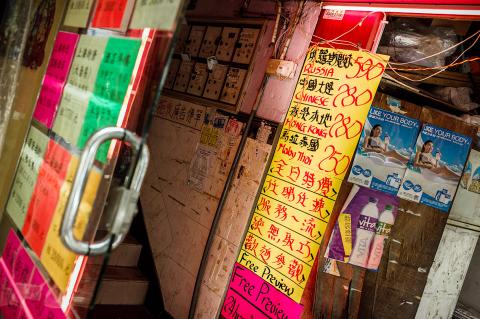In a Hong Kong tower block, prostitutes in one-room brothels sell themselves for as little as US$40 a time and are often exploited by triad gangsters and abusive clients.
However, an increasing number of sex workers, particularly migrants from mainland China, are complaining about the behavior of the police supposed to enforce the law, with some officers accused of helping themselves to free sexual services.
Hundreds, if not thousands, of sex workers ply their trade in one-room brothels, massage parlors, saunas and bars throughout the territory, where prostitution is legal but soliciting is not.

Photo: AFP
In an anonymous 20-story tower block close to a popular shopping district, men of all ages take the elevator to the top of the building, avoiding eye contact with each other as they circle down the dingy stairwells, ringing at doors where signs say either “welcome” or “wait.”
Muffled noises betray what is happening inside.
In one of the rooms, a 25-year-old prostitute sits on the edge of the bed, wearing only black underpants and a white T-shirt sporting a picture of a cartoon bird.
With its pink duvet, makeup kits, soft toys and television, the messy space could belong to a typical teenage girl.
However, the woman laughed uneasily and held out her wrist to show a network of cuts, some fresh, some faded, all self-inflicted.
“This job is no good. In my heart I am unhappy, but my face must be happy,” she said.
She is controlled by a member of one of the territory’s notorious triad gangs. Forced to work as a prostitute, she has to pay the gang member HK$2,000 (US$260) a day since an ex-boyfriend amassed huge gambling debts six years ago, using her as a guarantor.
Every day she sees five or six clients, or “fans” as she prefers to call them, earning HK$500 for 40 minutes, paying the HK$2,000 to her boss and keeping whatever is left.
She says she cannot escape or call the police because the triads will take revenge on her family, who do not know of her work.
“The girls here are all controlled,” she said.
Most are Chinese and so more vulnerable to police harassment than those from Hong Kong, she added.
“The police are afraid of Hong Kong girls because we can complain, but they are not afraid of China girls. If the China girls complain, they can arrest them,” she said. “I never thought Hong Kong had police like this”
It is against Hong Kong law for anyone to live off the earnings of a prostitute, and police say they are targeting the organized criminals controlling the women.
However, Zi Teng, a group campaigning for sex workers’ rights, collected 203 complaints from sex and massage workers against police in the first half of the year, more than double the figure for the previous six months.
The allegations included 32 accusations of officers taking free sexual services and eight of indecent assault, along with arbitrary arrests. There is no way of verifying the allegations and police say they attach “great importance to the proper conduct” of officers.
Nonetheless Zi Teng project officer Betty Shao said controversial police rules, which allow undercover officers to receive sexual services including masturbation as part of an investigation, reflect the city’s misguided policies when it comes to the sex industry.
“Sex work is like any other type of work and sex workers should have the same rights,” she said. “These three types of person — the police, bad customers and bad bosses — they’re the ones who are acting illegally, but the law cheats the migrant sex worker first.”
Hong Kong has seen a huge influx from mainland China since the handover from British control in 1997, with the number of visitors rising 15-fold to almost 28 million last year.
Police figures show arrests related to offenses involving sex workers from the mainland quadrupled in the same period to 3,752.
These migrants are often poorly educated, with a limited understanding of the language and law. Zi Teng says it does not report crimes to police because many are working illegally and fear being arrested themselves.
Some work in massage parlors, often fronts for sex industry premises.
Elsewhere in Hong Kong, in Wanchai’s red light district, Filipinos and Thais work on six-month “entertainment” visas, making commission from drinks bought for them by foreigners, before going back to their hotel rooms.
A female manager — or “mama-san” — at one venue said the women charge HK$1,800 for sex, keeping half, and giving half to the Chinese bar owners.
“Of course, the police know what’s going on,” she said, referring to this type of organized prostitution, but she added that officers turn a blind eye, in part because the women have work visas.
Back in the one-room brothel, the 25-year-old has two years left before her debts are paid. In the meantime she relies on her fellow sex workers for support.
“Police and the public are the same,” she said. “They think it’s normal if something bad happens to us.”

China on Monday announced its first ever sanctions against an individual Japanese lawmaker, targeting China-born Hei Seki for “spreading fallacies” on issues such as Taiwan, Hong Kong and disputed islands, prompting a protest from Tokyo. Beijing has an ongoing spat with Tokyo over islands in the East China Sea claimed by both countries, and considers foreign criticism on sensitive political topics to be acts of interference. Seki, a naturalised Japanese citizen, “spread false information, colluded with Japanese anti-China forces, and wantonly attacked and smeared China”, foreign ministry spokesman Lin Jian told reporters on Monday. “For his own selfish interests, (Seki)

VENEZUELAN ACTION: Marco Rubio said that previous US interdiction efforts have not stemmed the flow of illicit drugs into the US and that ‘blowing them up’ would US President Donald Trump on Wednesday justified a lethal military strike that his administration said was carried out a day earlier against a Venezuelan gang as a necessary effort by the US to send a message to Latin American cartels. Asked why the military did not instead interdict the vessel and capture those on board, Trump said that the operation would cause drug smugglers to think twice about trying to move drugs into the US. “There was massive amounts of drugs coming into our country to kill a lot of people and everybody fully understands that,” Trump said while hosting Polish President

Japan yesterday heralded the coming-of-age of Japanese Prince Hisahito with an elaborate ceremony at the Imperial Palace, where a succession crisis is brewing. The nephew of Japanese Emperor Naruhito, Hisahito received a black silk-and-lacquer crown at the ceremony, which marks the beginning of his royal adult life. “Thank you very much for bestowing the crown today at the coming-of-age ceremony,” Hisahito said. “I will fulfill my duties, being aware of my responsibilities as an adult member of the imperial family.” Although the emperor has a daughter — Princess Aiko — the 23-year-old has been sidelined by the royal family’s male-only

A French couple kept Louise, a playful black panther, in an apartment in northern France, triggering panic when she was spotted roaming nearby rooftops. The pair were were handed suspended jail sentences on Thursday for illegally keeping a wild animal, despite protesting that they saw Louise as their baby. The ruling follows a September 2019 incident when the months-old feline was seen roaming a rooftop in Armentieres after slipping out of the couple’s window. Authorities captured the panther by sedating her with anesthetic darts after she entered a home. No injuries were reported during the animal’s time on the loose. The court in the